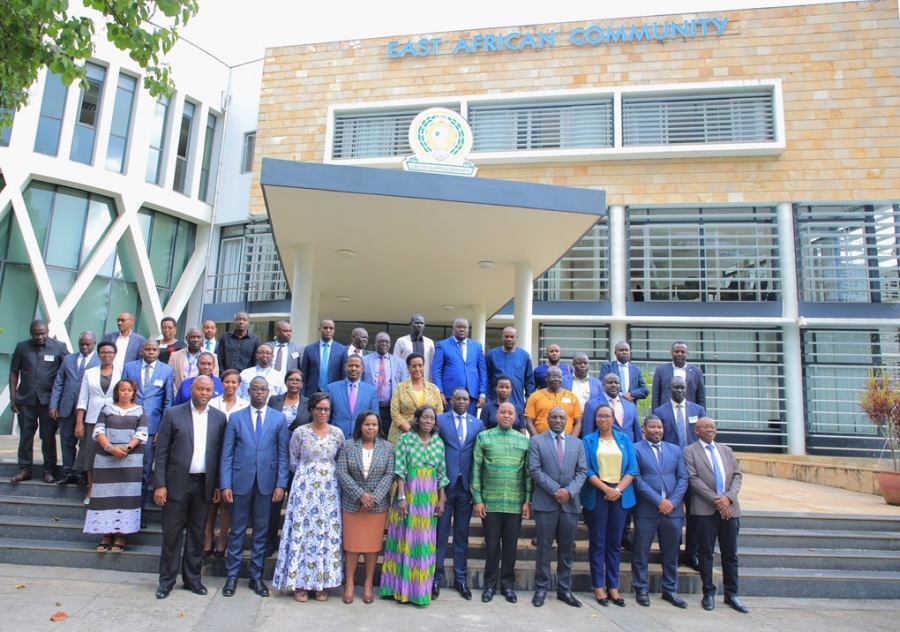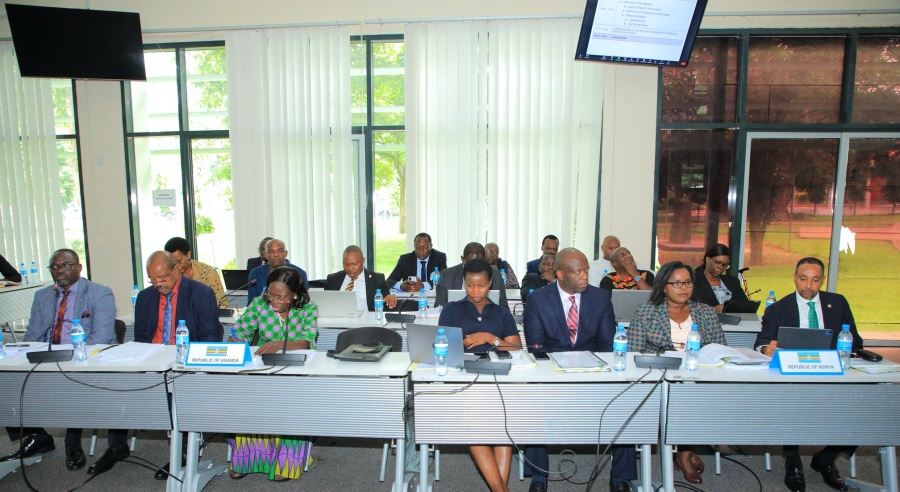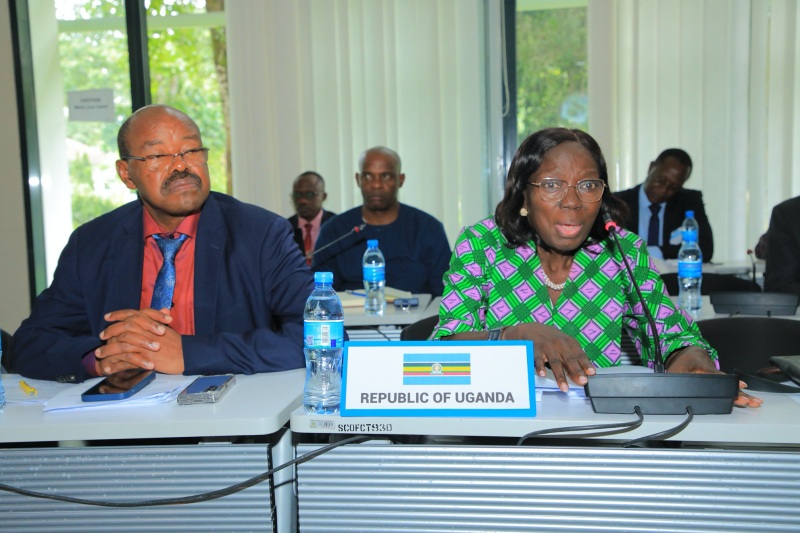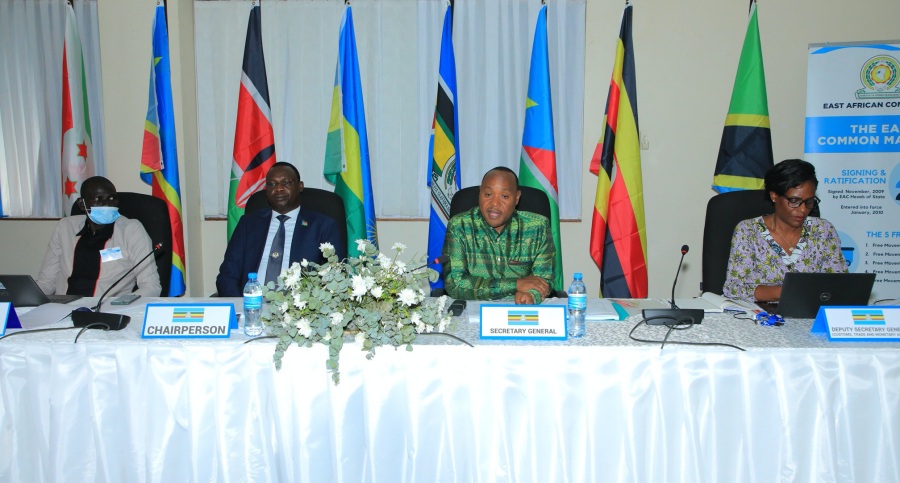
EAC embarks on use of Mobile App to eliminate NTBs
East African Community Headquarters, Arusha, Tanzania, 12th February, 2024: The East African Community Secretariat and Partner States have been directed to operationalise the EAC Elimination of Non-Tariff Barriers (NTBs) Mobile Application including sensitisation by 30th April, 2024.
Making the directive, the Ministerial Session of the 43rd EAC Sectoral Council on Trade, Industry, Finance and Investment (SCTIFI) that was held at the EAC Headquarters in Arusha, Tanzania further commended Trademark Africa for supporting the development of the EAC Elimination of Non-Tariff Barriers (NTBs) Mobile Application.
The EAC Elimination of NTBs Mobile Application was developed to ease the reporting, monitoring and elimination of NTBs in the Community. The EAC Elimination of Non-Tariff Barriers (NTBs) Mobile Application was finalised and piloted during the National Monitoring Committee (NMCs) meetings in March 2023.
The EAC NTBs App allows the users to report the complaints in one of the three (3) EAC official languages, i.e., English, Swahili and French. The mobile app can be downloaded from the Apple Store, Google’s Play Store, and other Android devices, and can be accessed through https://eac-mobile.portal.africa/
The Secretariat in collaboration with Trademark Africa (TMA) officially launched the EAC Elimination of Non-Tariff Barriers (NTBs) Mobile Application at the official opening ceremony of the 23rd EAC MSMEs Trade Fair held on 8th December, 2023 in Bujumbura, Burundi.
Further, the Secretariat with support from Trademark Africa will undertake sensitisation and capacity building of relevant public and private stakeholders in Partner States on the EAC Elimination of NTBs Mobile Application to ensure timely reporting, monitoring and elimination of NTBs in the Community.
NTBs have been a major hindrance to the free movement of goods as enshrined in the EAC Customs and Common Market Protocols. Ordinarily, NTBs refer to any obstacles to international trade that are not import or export duties. NTBs may take the form of import quotas, subsidies, customs delays, technical barriers, or other systems preventing or impeding trade.
On the status of resolution of NTBs for the period July - November 2023, the Ministers were informed that nine (9) NTBs remain Outstanding while two (2) NTB were resolved. Cumulatively, 269 (Two Hundred and Sixty-Nine) NTBs were resolved cumulatively since 2007.
The Ministers noted that NTB-001-114 on exercise books between the Republic of Uganda and Kenya was resolved through the amended VAT Act of 2022.

The meeting directed the Republic of Uganda and Republic of Kenya to hold a bilateral meeting to resolve NTB 000-864 on discriminatory excise duty on juice by 30th June, 2024 and report to the 45th SCTIFI.
The Sectoral Council also directed the Republic of Kenya and the United Republic of Tanzania to undertake a joint verification on motorcycle accessories transferred from Kenya to Tanzania by 30th June, 2024 and report to the 45th SCTIFI.
The Ministers directed the Secretariat to prioritize the harmonisation of calibration services for the road tankers in the Region in the financial year 2024/2025.
On the prioritisation of negotiations with the seven (7) countries that have requested for Free Trade Area (FTA) arrangements with the Community, the SCTIFI approved negotiations of FTA Agreements between the EAC and the United Kingdom, United Arab Emirates, Pakistan and Singapore.
The SCTIFI directed the Secretariat to engage the United Kingdom, United Arab Emirates, Pakistan and Singapore by 30th July, 2024 on commencement of negotiations for FTA Agreements.
The Ministers resolved that negotiations with Turkey, China and Serbia will be undertaken after negotiations of FTAs have progressed with the United Kingdom, United Arab Emirates, Pakistan and Singapore.
With regard to the simplification and reforms in avocado export procedures in the Community, the Ministers directed Partner States to undertake simplification of export procedures for avocado commodity and other exports of fruits and vegetables.
Partner States were further directed to rationalise the issuance of various permits and licensing requirements with a view to eliminating those that are not necessary to meet the objectives being sought by the private sector.
The Ministers resolved that Partner States should introduce risk management in ensuring regulatory compliance in addition to developing a common and standardised list of documentary and information requirements for avocado and other vegetables and fruits exports that adopts global best practices.
The SCTIFI also directed Partner States and the Secretariat to mobilise resources for quality infrastructure for fruits and vegetables.
The Secretariat was also directed to convene a meeting of Trade and Customs experts to rationalise the permits and licensing requirements on agricultural exports and develop common and standardised export documents by 30th April, 2024.
Speaking during the opening session of the Ministerial Session, the Chairperson of the SCTIFI, Hon. William Anyuon Kuol Wol, observed that efforts to reduce NTBs within the EAC have been commendable.
“However, to sustain this progress, it was imperative for all stakeholders, including the private sector, to play a pivotal role in holding the EAC accountable and in devising effective mechanisms to address and monitor the reduction of NTBs,” said Hon. Wol.
Hon. Wol further highlighted the progress in implementing the Single Customs Territory and the impact of One Stop Border Posts on reducing transit costs, as notable achievements but pointed out that it was vital to engage in outreach programmes that educate East Africans about the integration process and its relevance in their lives.
In his remarks, EAC Secretary General Hon. (Dr.) Peter Mathuki, said that there has been a consistent upward trend in intra-trade values in recent years.
“In the financial year 2021 / 2022, intra-trade reached US$ 8.7 billion, followed by a further increase to US$ 9.4 billion in the financial year 2022/2023. This demonstrated a robust trading environment among EAC Partner States, with a notable growth of approximately 7.98%,” said Dr. Mathuki.
Dr. Mathuki urged the Ministers to address issues relating to denial of preferential market access for EAC Originating goods, non-ratification of key EAC instruments, finalisation of EAC Tariff Offers for Category B and C to give impetus to Intra-African trade, cross-border challenges affecting the free movement of goods and persons and resolution of existing NTBs.

Also present at the meeting were Mr. Bruno Mbayi Bashadila (Ministry of External Trade, DRC), Hon. Marie Chantal Nijimbere (Minister of Trade, Transport, Industry and Tourism, Burundi), Hon. Peninah Malonza (Cabinet Secretary, Ministry East African Community, the ASALs and Regional Development, Kenya) and Mr. Richard Niwenshuti (Ministry of Trade and Industry, Rwanda).
Others were Hon. Exaud S. Kigahe, Deputy Minister for Industry and Trade, Tanzania), Hon. Rebecca Kadaga (1st Deputy Prime Minister and Minister of EAC Affairs, Uganda) and Ms. Annette Ssemuwemba, the EAC Deputy Secretary General in charge of Customs, Trade and Monetary Affairs.
For more information, please contact:
Simon Peter Owaka
Senior Public Relations OfficerCorporate Communications and Public Affairs DepartmentEAC SecretariatArusha, TanzaniaTel: +255 768 552087Email: This email address is being protected from spambots. You need JavaScript enabled to view it.
About the East African Community Secretariat:
The East African Community (EAC) is a regional intergovernmental organisation of seven (7) Partner States, comprising the Republic of Burundi, the Democratic Republic of Congo, the Republic of Kenya, the Republic of Rwanda, the Republic of South Sudan, the Republic of Uganda and the United Republic of Tanzania, with its headquarters in Arusha, Tanzania. The Federal Republic of Somalia is in the process of becoming a full member of the Community after its admission into the EAC bloc by the Summit of EAC Heads of State on 24th November, 2023.
The EAC Secretariat is ISO 9001: 2015 Certified

